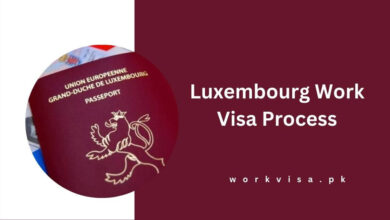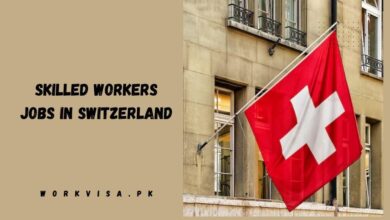Romania Work Visa 2025 – Application Process

Romania is becoming a preferred destination for professionals with specialized skills on a global scale. Changes to work visa policies and a new list of high-demand occupations have made it simpler than ever to begin your career in this Eastern European jewel. Romania’s objective is to enhance its economy and address workforce shortages through the implementation of updated EU Blue Card schemes, increased quotas, and streamlined procedures.
Are you prepared to capitalize on the opportunity? Let us delve into the specifics and determine whether you are eligible for a Romanian work visa.
Check Also: Romania Work Visa with Family for Skilled Workers
Highlights of Changes Made
Romania implemented numerous significant modifications to its work visa policies:
- Quotas Increased: The annual quota for non-EU laborers was increased to 100,000.
- EU Blue Card Updates:
- The validity period was extended to three years.
- Academic qualifications may now be replaced by professional experience.
- A simplified procedure for family reunification.
- Employer Activity Requirements: In order to employ foreign laborers, employers must have been operating in Romania for a minimum of one year.
- Faster Processes: Employers are required to finalize employment contracts within 15 business days of a worker’s entrance into Romania.
New Skill Shortage and High-Demand Occupations
Romania’s skill shortage list has been revised to reflect the changing requirements of its workforce. The following is a summary:
| Sector | High-Demand Occupations | Estimated Monthly Salary (EUR) |
|---|---|---|
| Healthcare | Doctors, Nurses, Medical Technicians | 2,500–4,500 |
| Engineering | Civil Engineers, Mechanical Engineers | 2,000–3,500 |
| Information Technology | Software Developers, Data Analysts, IT Managers | 3,000–5,000 |
| Construction | Bricklayers, Welders, Woodworkers | 1,500–2,800 |
| Hospitality | Chefs, Hotel Managers, Tour Guides | 1,200–2,000 |
| Agriculture | Seasonal Farm Workers | 800–1,200 |
Types of Work Visas Available
In order to accommodate a wide range of requirements, Romania provides a variety of work visas:
- General Work Visa: For the purpose of standard employment in Romania.
- Seasonal Work Visa: For transient employment in the hospitality, tourism, and agriculture sectors.
- EU Blue Card: Awarded to professionals who possess exceptional skills and satisfy specific qualifications.
- Intra-Company Transfer Visa: For personnel who are transferring within multinational corporations.
- Self-Employed Visa: For entrepreneurs and freelancers who wish to operate in Romania.
Ref: https://www.mae.ro/en/node/2035.
Benefits:
- Permission to Work Legally: The work visa enables foreign nationals to legally labor in Romania for a designated employer and job position.
- Access to Employment Opportunities: Provides access to Romania’s expanding employment market, with a particular emphasis on industries such as IT, construction, healthcare, manufacturing, and agriculture.
- Residency Pathway: A temporary residence permit can be obtained by obtaining a work visa.
- Reunification of Families: Work visa holders are eligible to apply for family reunification, which will enable their spouse and dependent children to join them in Romania.
- Competitive Compensation and Benefits: Workers in Romania frequently receive wages that are competitive with the cost of living, which is relatively modest in comparison to other EU countries.
- Possibility of Employment in the European Union: The experience acquired in Romania can be beneficial for the pursuit of opportunities in other EU countries.
- Cost of Living That Is Reasonable: Romania’s cost of living is lower than that of numerous Western European countries, which facilitates the accumulation of savings.
- Access to Social Security Benefits: In exchange for their contributions to Romania’s social security system, work visa holders are granted access to a variety of benefits, including healthcare services.
- Exposure to a Dynamic Culture: Individuals have the opportunity to immerse themselves in Romania’s rich culture, history, and traditions by residing and working there.
- Career Development and Networking: Establish professional relationships with Romania’s expanding industries.
- Work-Life Balance: A significant number of Romanian organizations prioritize work-life balance by providing paid time off and reasonable working hours.
- Workplace with a Multilingual Environment: Romania’s workforce is becoming more multilingual, with English, French, and German being frequently employed in the workplace.
Eligibility Criteria
In order to be eligible for a Romanian work visa, the following criteria must be satisfied:
- Job Offer: A valid employment contract from a Romanian employer.
- Qualifications: Academic qualifications, experience, or relevant talents.
- Language Proficiency: Although not required for all positions, proficiency in Romanian or English is advantageous.
- Health Insurance: Valid health insurance for the duration of your stay.
- Clean Criminal Record: Evidence of the absence of any criminal convictions.
Can You Bring Your Family to Romania?
The family reunification process also allows you to transport your family to Romania on a work visa. Your spouse, dependent parents, and children under the age of 18 are all considered eligible family members. You are required to furnish evidence of a valid work visa, adequate income, appropriate housing, and health insurance coverage for your family.
Family members may petition for long-term visas at Romanian consulates following approval from the General Inspectorate for Immigration. If they qualify under specific visa categories, such as the EU Blue Card, or acquire a work permit, spouses are permitted to work in Romania.
Application Process
To apply for a Romanian work visa, adhere to the following steps:
- Obtain a Job Offer: Secure employment with a Romanian company through National Employment Agency (ANOFM), Public Job Portal (posturi.gov.ro), EURES Romania, or EURAXESS Romania.
- Apply for a Work Permit: The General Inspectorate for Immigration will receive the work permit application from your employer.
- Document Gathering: Gather the requisite documents, such as your passport, employment contract, and evidence of qualifications.
- Submit Visa Application: Apply for a long-stay visa (D/AM type) at a Romanian consulate in your home country.
- Attend an Interview: If necessary, attend the visa interview and provide biometric data.
- Obtain Approval: Upon approval, gather your visa and prepare for your relocation to Romania.
Romania is offering a more expansive welcome. Romania’s high-demand sectors and evolving work visa policies may serve as your subsequent career destination, regardless of whether you are a seasoned professional or a skilled worker seeking new opportunities. See if you are eligible and commence your journey immediately!
Frequently Asked Questions:
-
How can I get a Romania work visa?
To get a Romania work visa, you must have a work permit from the Romanian Inspectorate General for Immigration. It is your employer in Romania who applies for a work permit on your behalf. After you receive a work permit, you may apply for the Romania work visa from your country.
-
Is a Romania visa easy?
Romania has many bilateral or multilateral visa agreements with different countries all over the world that eliminate lengthy visa processes. Listed countries’ citizens can stay in Romania for 90 days within a 180-day period without requiring a visa.
-
How much does a Romania work visa cost?
The application fee for a work visa in Romania is USD 150, applicable for the long-stay employment visa.




